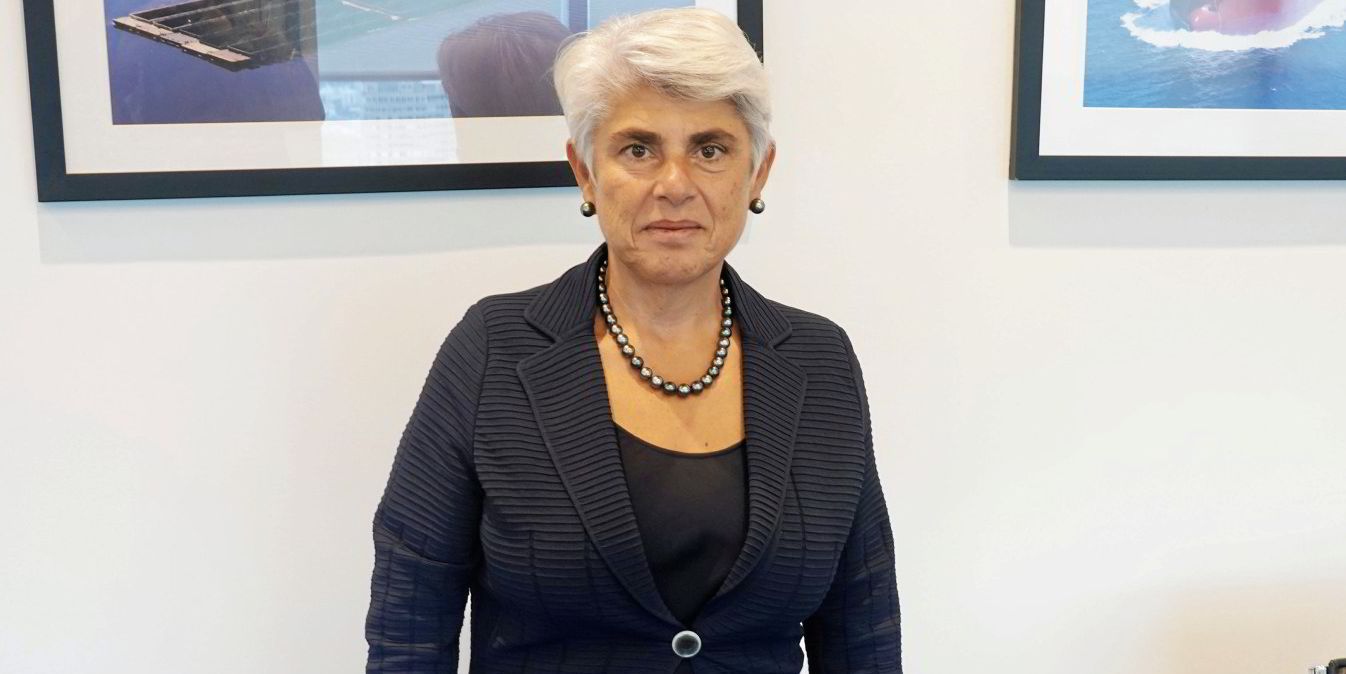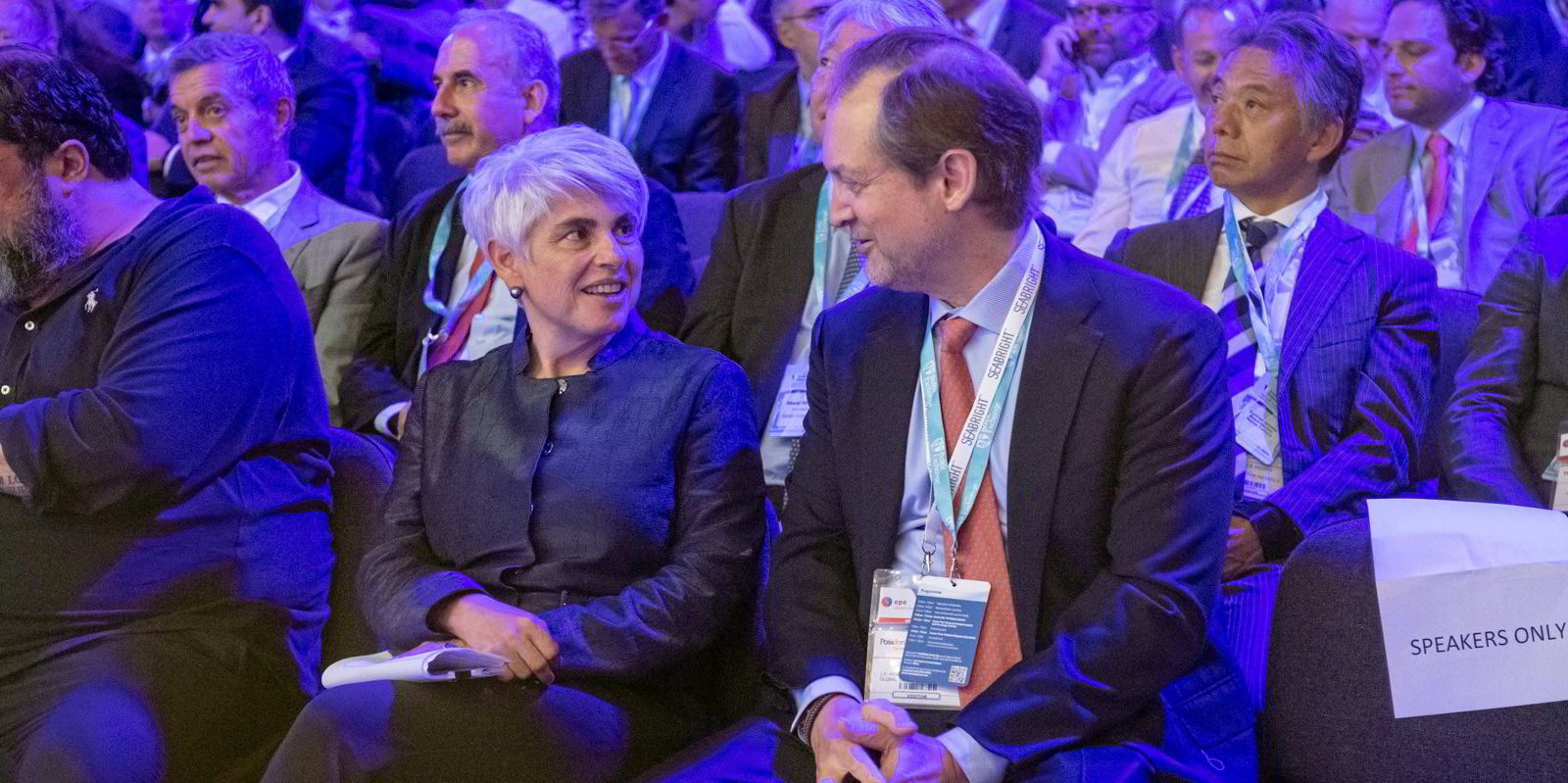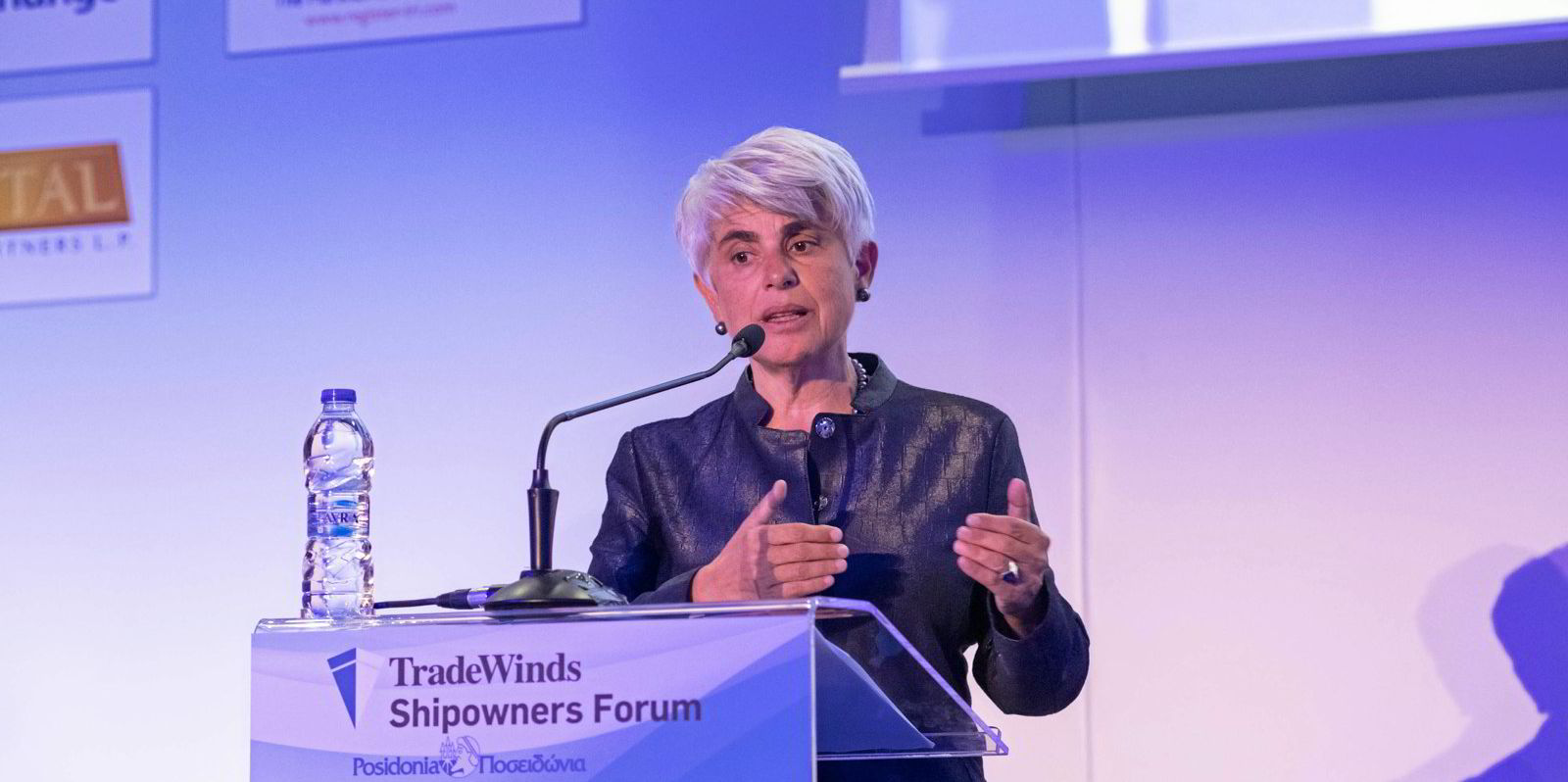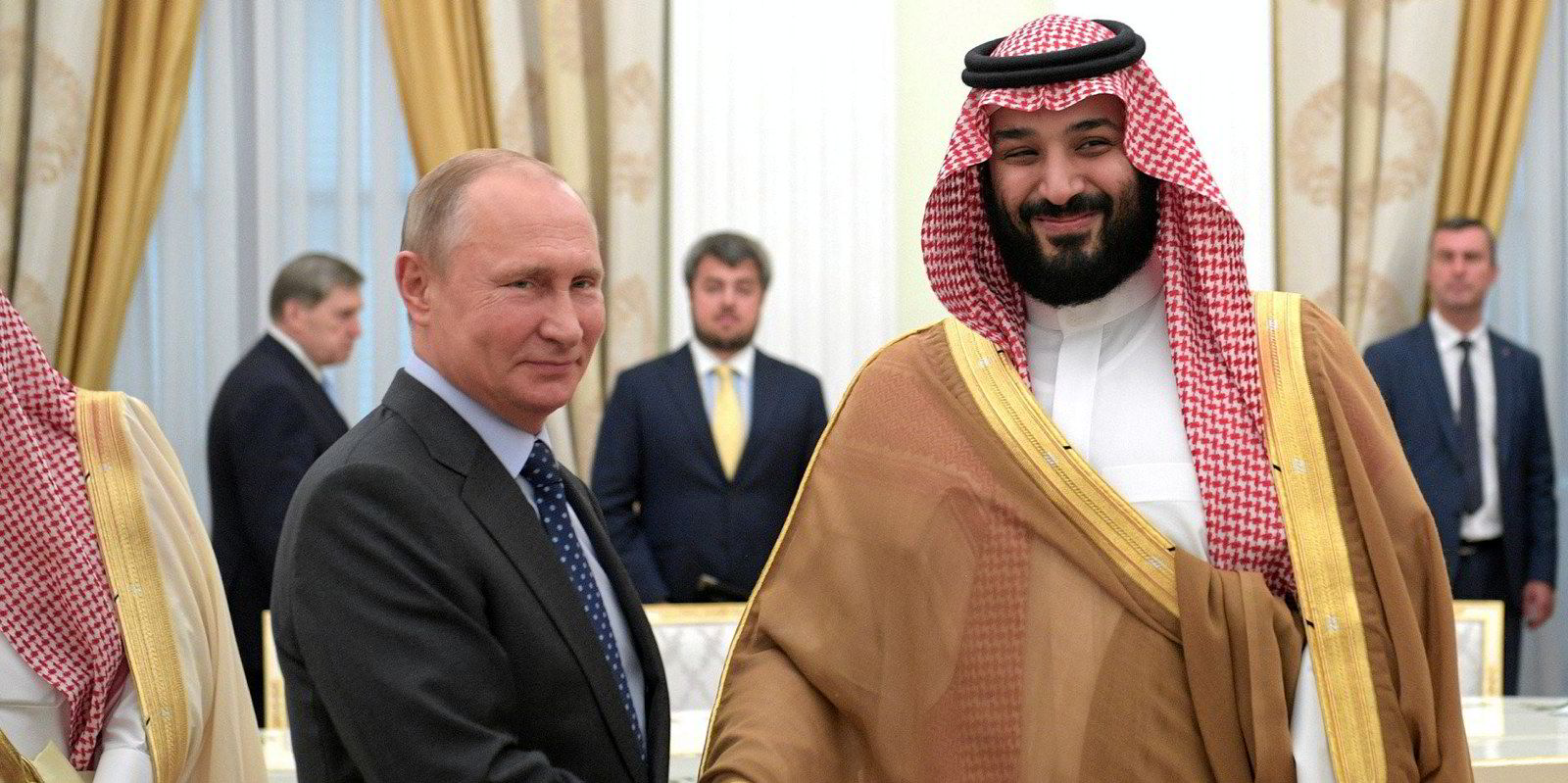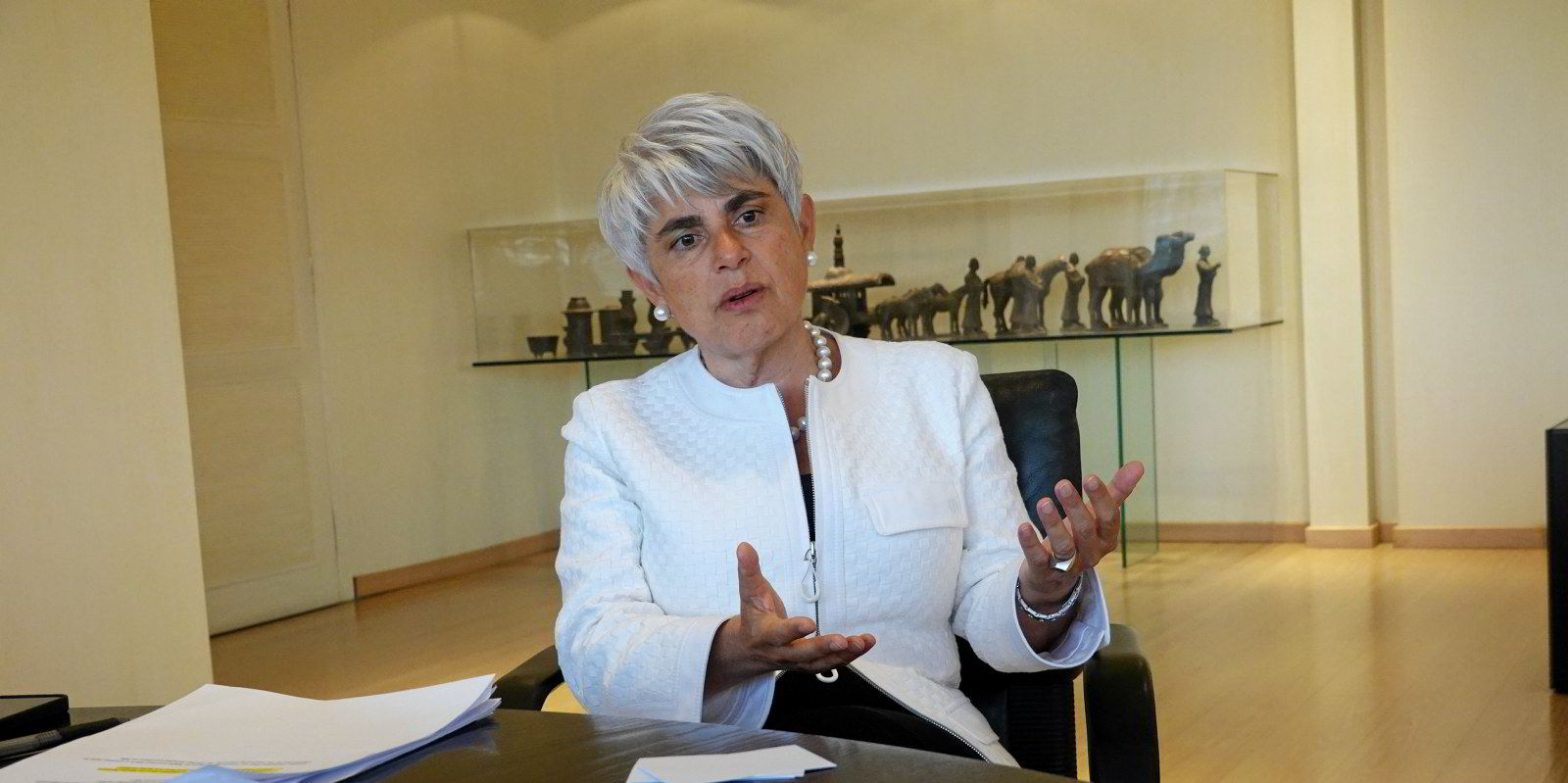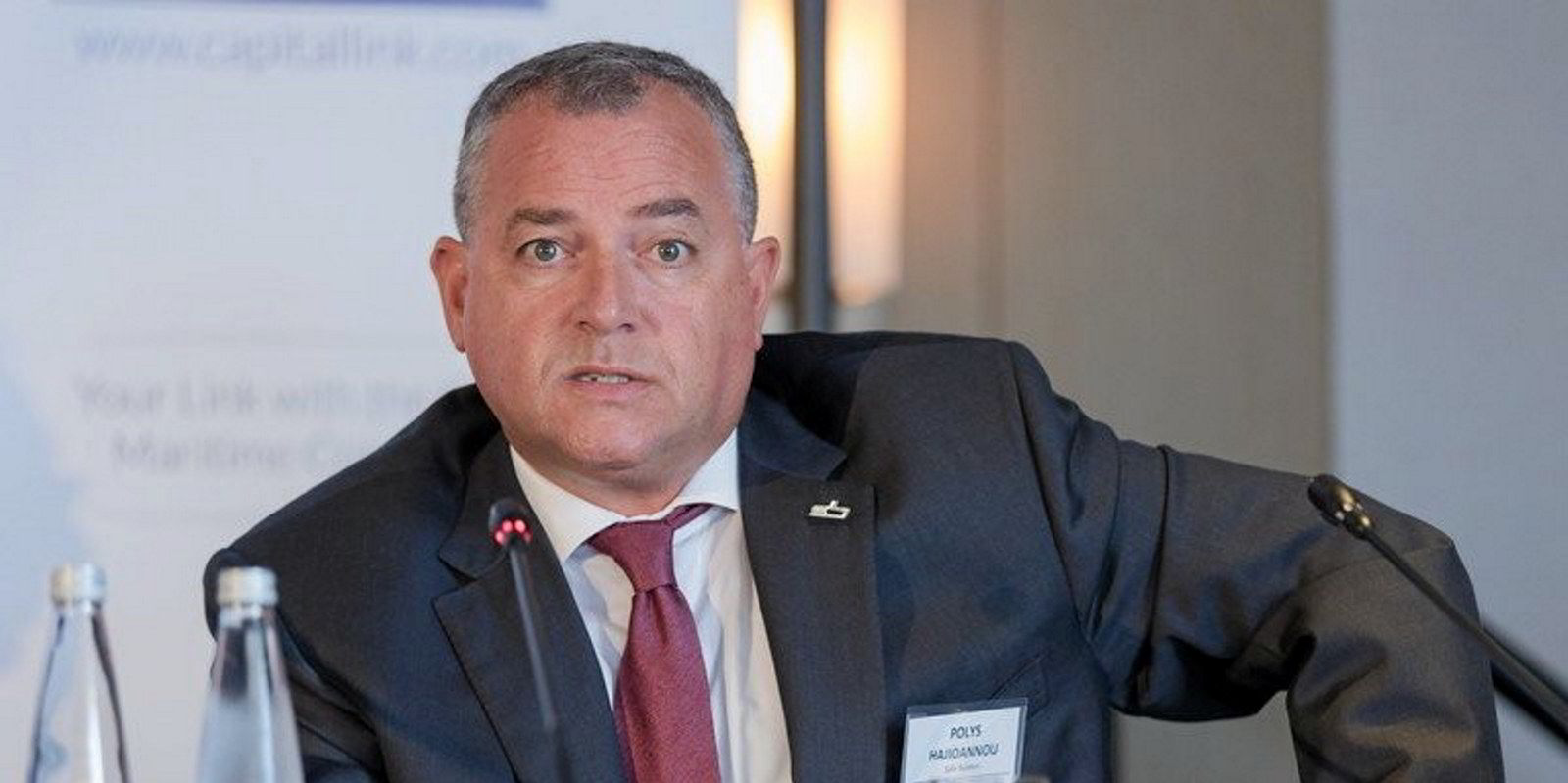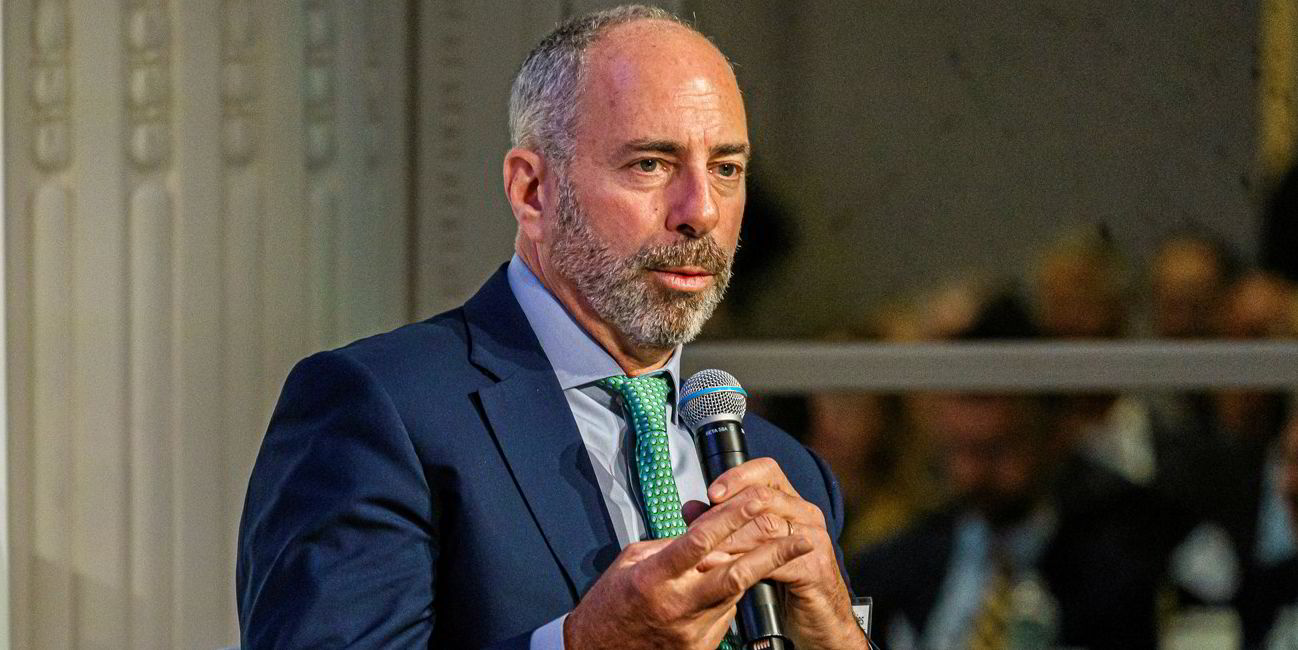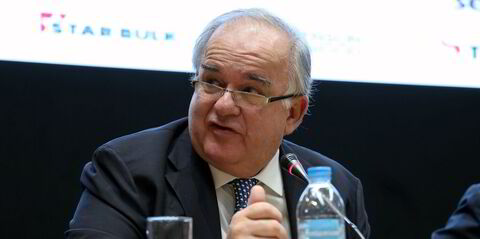If you are used to executives of public shipowners painting a rosy picture of the future — about how the outlook is bright and any downturn is an opportunity — recent messaging by Angeliki Frangou may take you off guard.
The Greek shipowner, who controls the Navios Group and is chief executive of New York-listed Navios Maritime Partners, sees an array of macroeconomic risks that she has described as “clouds on the horizon” in what are otherwise strong shipping markets.
In a conference call with analysts, an interview with TradeWinds and at a dinner to celebrate Navios Group’s upcoming 70th anniversary, she rattled off a series of gloomy omens that loom over shipping, including mounting government debt, unprecedented monetary policy, geopolitical divisions and economic troubles in China.
“These factors, along with the wars in Ukraine and Israel, are contributing to making this one of the most dangerous times in memory,” Frangou said in the analyst call.
The comment echoed her address to the anniversary dinner in New York, where she quoted JP Morgan Chase chief executive Jamie Dimon about mounting economic risks driven by geopolitical tensions.
For Navios Partners, soon to be the lone public company in what had once been a stable of listed outfits helmed by Frangou, the chief executive said the answer to these risks is its diversified fleet of nearly 200 vessels and its corporate priorities, which include keeping its loan-to-value ratio at between 20% and 25% and cash amounting to about $2m per ship.
But the dark clouds are Exhibit A for a philosophy that, while volatility provides opportunities, protecting against downside risk is key in the industry known for boom-and-bust cycles.
“I think shipping … is about risk management,” she said during an interview in the Navios Group offices in New York.
Asked about her “dangerous times” comment, she told TradeWinds that the macro environment is “not bad” despite the clouds that exist on the horizon.
One key positive that she has pointed to is the strength of the US economy, which she described as generally healthy.
But that even comes with risk: America’s national debt is at its highest level ever in peacetime, she said.
And amid the possibility that the Federal Reserve will continue to ratchet up interest rates, the US central bank is also carrying out quantitative tightening. A monetary policy mechanism that is the reverse of quantitative easing that had gone on for more than a decade, quantitative tightening involves shrinking the Fed’s balance sheet, which has the effect of reducing the amount of cash in financial markets.
But the Fed is in uncharted waters with the programme.
“Has anyone done quantitative tightening before? I don’t think so,” Frangou said.
Frangou said the world’s second-largest economy, China, is not firing on all cylinders.
“And on top of that, there are huge geopolitical risks,” she said.

Russia’s invasion of Ukraine, which started in February of last year and was followed by sanctions that forced trade flows to reshuffle, was at first a shock.
But Frangou said the conflict forced the reengineering of supply chains, and the world was able to adapt quickly.
The world’s newest war in Israel and Gaza, however, could present new challenges for shipping if it expands to a regional conflict.
Frangou said more than 40% of seaborne crude passes through the Strait of Hormuz and a quarter of all gas.
Then there are the tens of thousands of ships that pass through the Suez Canal each year.
While there is at least another route for the canal, albeit with longer tonne-miles, it is not easy to engineer a solution for a problem in the Strait of Hormuz.
“Should any of these areas become disrupted, the potential impact will be well beyond what we felt with Ukraine,” she said at the Navios Group anniversary dinner.
Key to Frangou’s risk management view of shipping, in recent years, has been Navios Partners’ diversification that began in the depths of the Covid-19 pandemic as the outfit merged with separately listed Navios Group entities focused on the container shipping and tanker space.
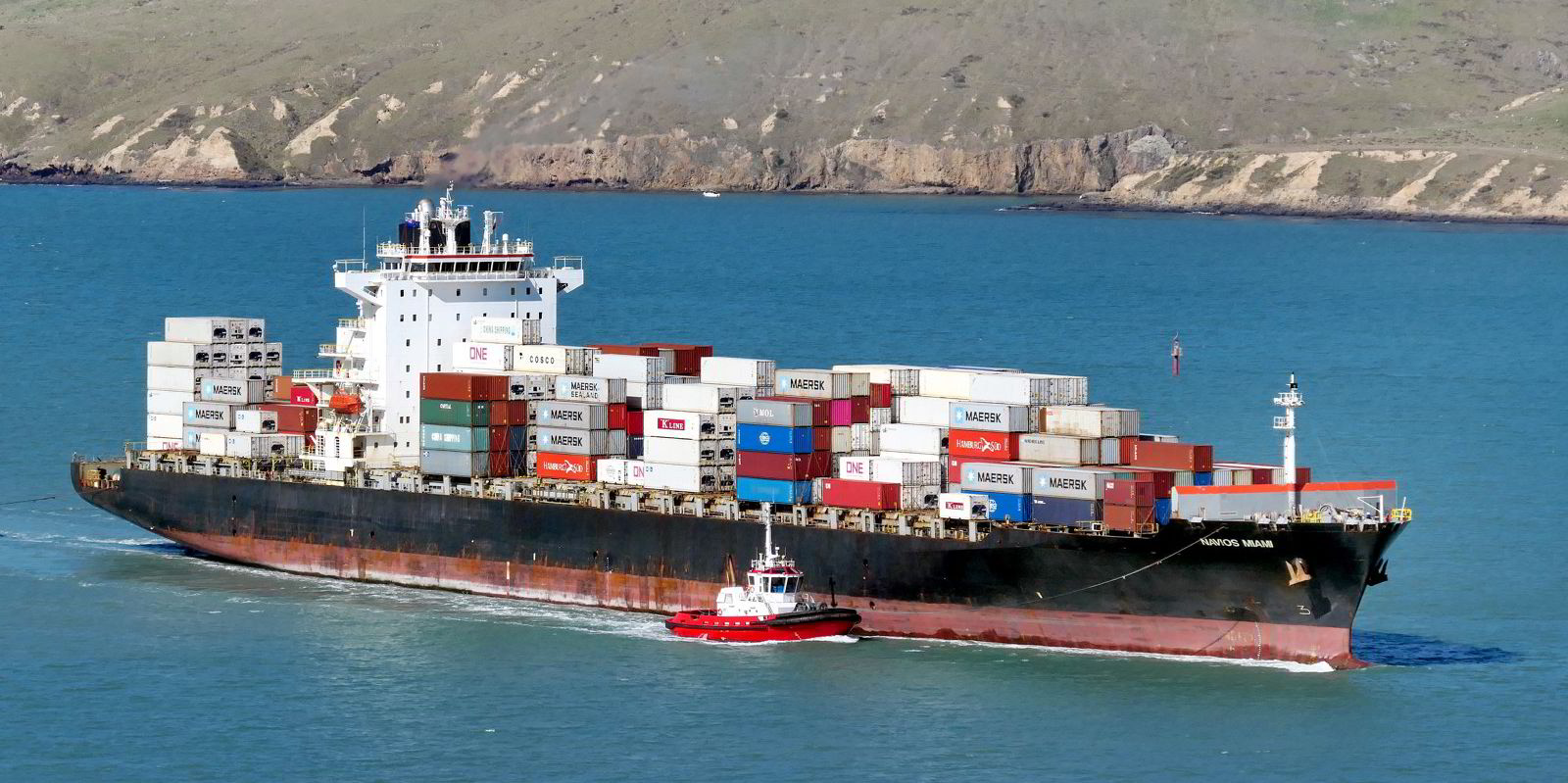
It concluded last year with the purchase of the bulker fleet of Navios Maritime Holdings, which Frangou is in the process of taking into her private ownership, leaving Navios Partners as the lone public company in the group she controls.
The executive said diversification allows her company to lock ships into charters when rates in some sectors are high, and allocate money to purchase vessels in sectors that are in the low part of the cycle. And unlike other pure-play companies, diversified companies do not have to get everything right to keep a healthy balance sheet, she said.
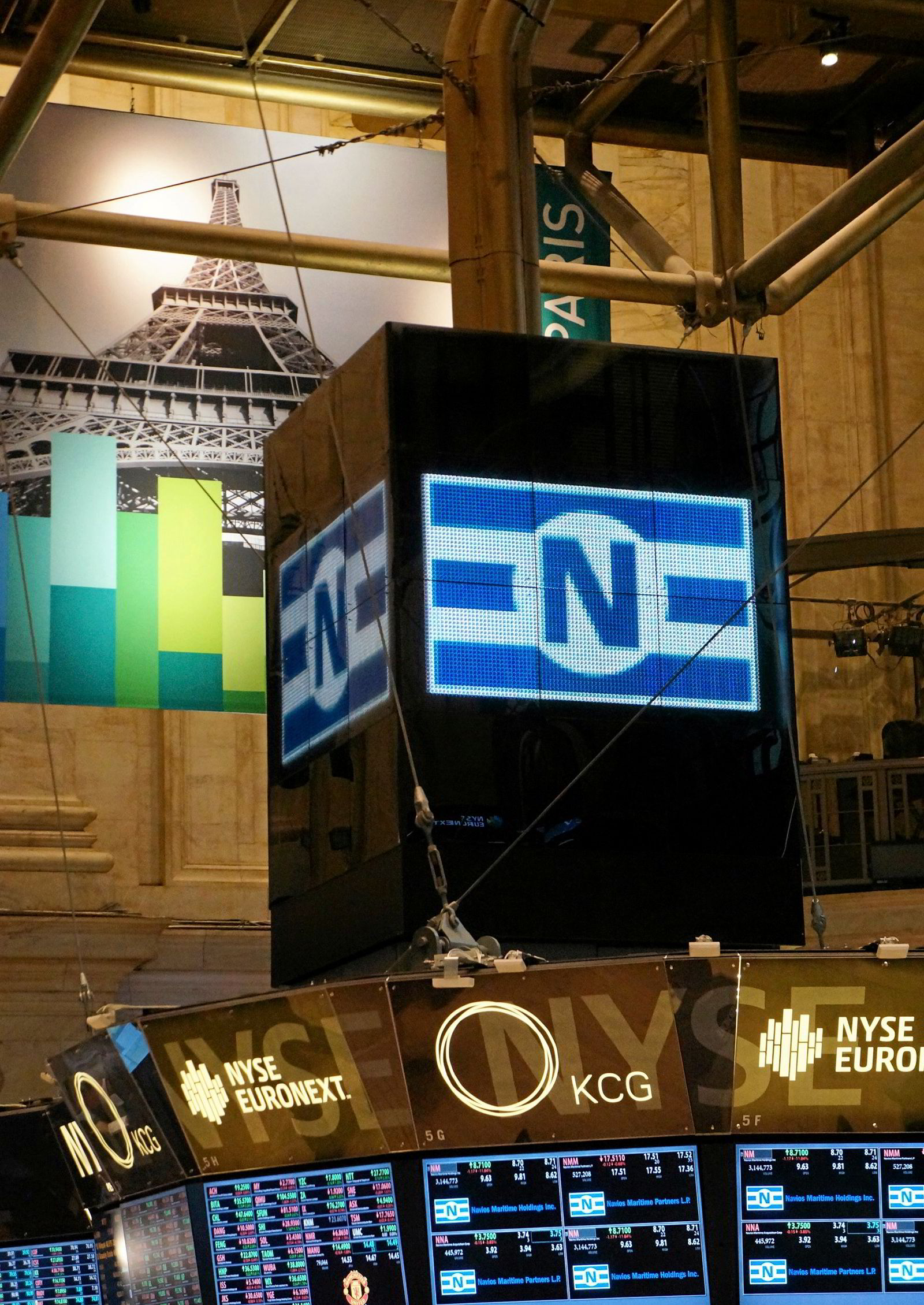
“Diversification allows you to have greater opportunities, less risk,” she said.
She noted that previously pure-play listed shipowners have taken similar moves into other sectors, particularly those that profited from the container shipping boom and reinvested in, for example, bulkers. And Frangou said it is something that large private shipowners have known for some time.
However, Navios Partners’ focus on risk management is not new.
Chris Wetherbee, head of global transportation research at US bank Citi, has been tracking Navios Group since 2005, the year that Frangou took the former US Steel subsidiary to the New York Stock Exchange in an IPO. Navios Partners, which trades under the ticker symbol NMM, was created two years later.
“This NMM entity has a history of being … a more prudent manager of risk than maybe some of her other shipowning colleagues,” he told TradeWinds.
“Navios has been always a little bit more rooted in risk management as a higher priority aspect of how she approaches managing these companies than maybe some others.”
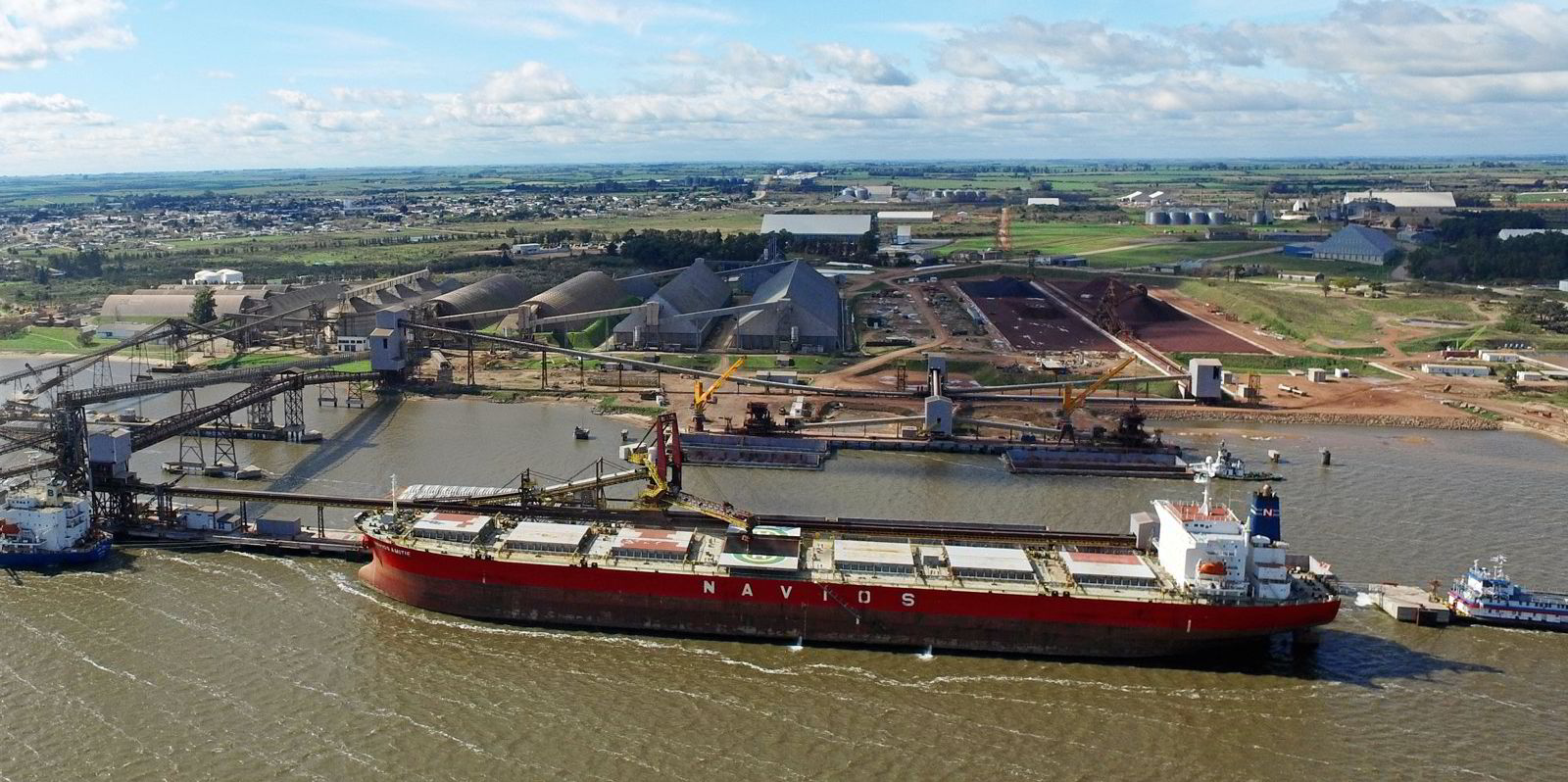
In an industry in which public shipping companies have historically been run by executives with a higher degree of risk tolerance, Wetherbee noted that Frangou stood out early on for a willingness to, for example, tie up ships on long-term contracts even in strong spot markets.
“Essentially, a vessel on a charter was earning less than the vessel would be making in the spot market. But she was willing to do that in order to preserve the visibility of cash flows and long-term viability,” Wetherbee said.
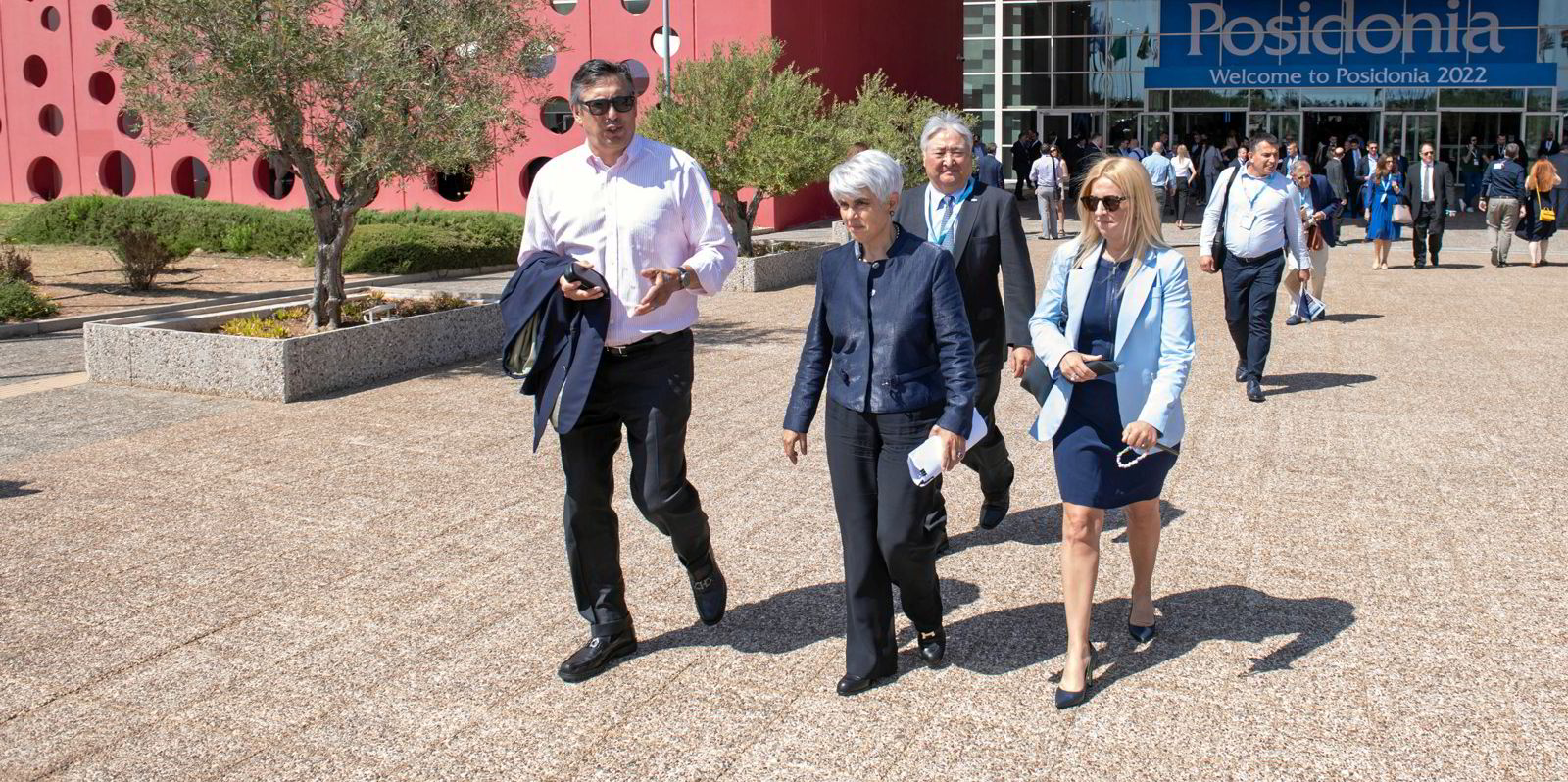
Navios Maritime Holdings is an owner of bulkers, tankers and container ships.
Founded: 2007
Headquarters: Pireaus, Greece
Fleet: 190 ships made up of 80 bulkers, 47 container ships and 53 tankers
Orderbook: 28 newbuildings made up of 16 tankers and 12 container ships
Stock listing: New York Stock Exchange ticker NMM
Key executives: Angeliki Frangou, chairwoman and chief executive; George Achniotis, executive vice president for business development; Shinji Sasada, president; Efstratios Desypris, chief operating officer; Erifili Tsironi, chief financial officer; Ted Petrone, vice chairman
Then there is the opportunities side of the coin. The pursuit of opportunities has led Navios Partners to focus on tanker acquisitions, most recently with the order of four LR2 product carriers.
The aframax-sized tankers bring the company’s total orderbook to a $1.7bn investment in 28 newbuildings, 16 of which are tankers.
But the Piraeus-headquartered shipowner has also engaged in a selling spree that has seen it unload 13 ships so far this year for proceeds of $242m, with a focus on divesting bulkers that are more than 15 years old.
Frangou told TradeWinds that the sales came as the dry bulk vessels neared the end of their lifespan but still had surprisingly high values on the secondhand market.
“If you see multiples of what you thought residual value could be, it’s a good price,” she said.
And with the proceeds, she said, Navios Partners elected to “redeploy the money on something that makes more sense” in the form of the tanker acquisitions.
This, the executive said, also allows Navios Group to reduce its carbon footprint — selling less-efficient vessels and building new ones with technologies that reduce fuel consumption.
Some shipowners have moved into orders of alternative fuels, but that is not part of Navios Partners’ strategy yet. And Frangou said her company would order vessels that run on, for example, methanol if her customers wanted it, and some of its newbuildings are methanol-ready. But so far it is only in the container sector where charterers have end users that will pay for greener fuels, the Navios Group leader said.
Asked how Navios Partners decides which type of vessel to invest in, she said factors include being able to charter the ships at an annual return of around 10% to 12% and with vessels that have a low risk of residual value loss at the end of a five-year charter.
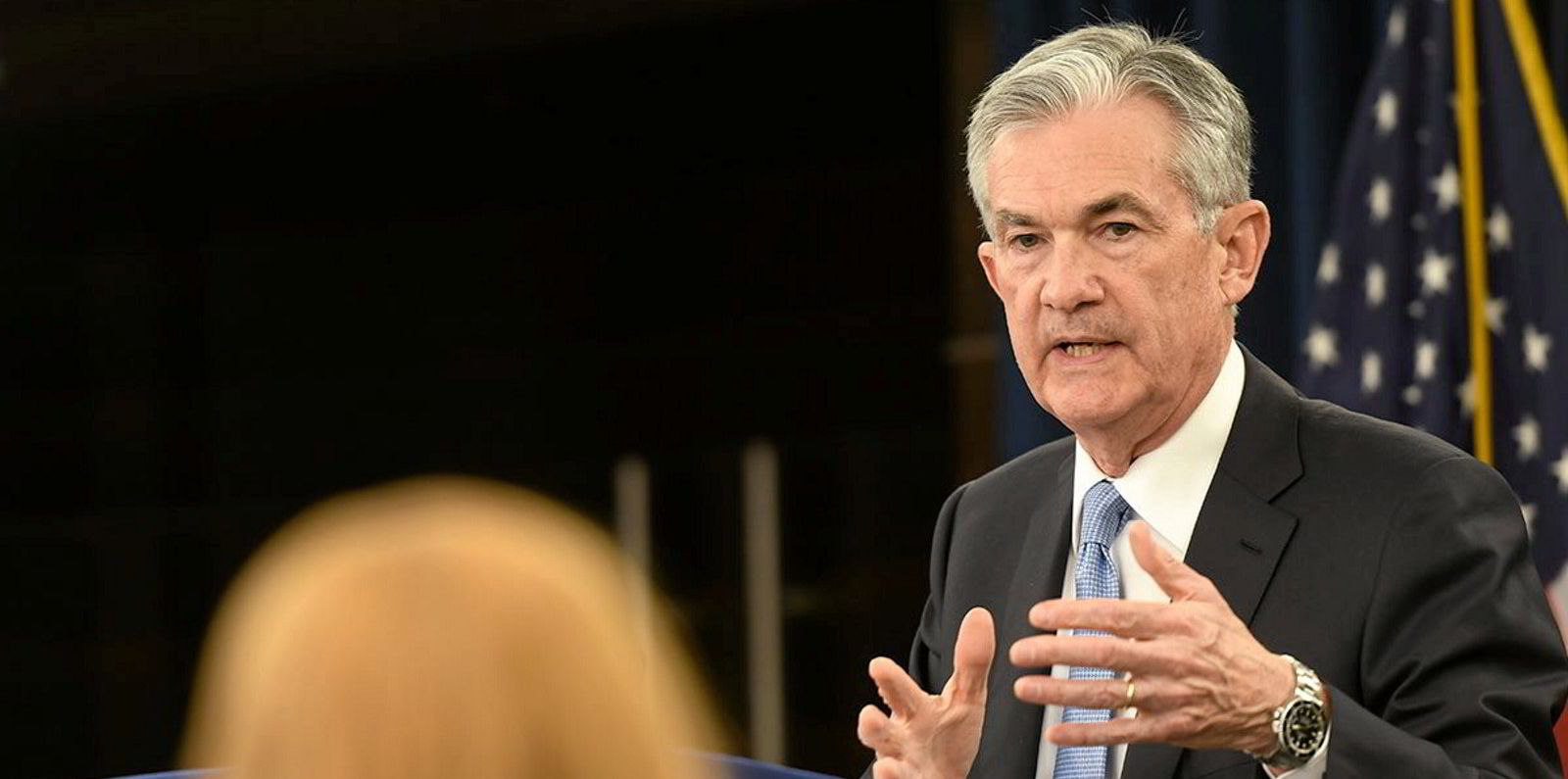
If Frangou sees more promise in a particular sector for Navios Partners’ next deal, she would not say. She explained that the company looks at new deals constantly.
“What we really decide is a very, very small percentage of what we look at,” she said. “This is an ongoing process.”
With Navios Partners’ fleet size, that is what the company has to do if it wants to keep its fleet’s age profile from getting older, which requires selling more than 10 to 15 vessels a year just to stay even.
“We accelerated that because we saw opportunities,” she said of the series of bulker sales.
Despite the larger fleet size, Navios Partners has not put that cash into growing its payout to shareholders, keeping its quarterly dividend at $0.05 per share since May 2020.
Citi’s Wetherbee said Navios Partners’ capital allocation has been reasonable, given the uncertainty that its management sees in the global economy.
“Maybe putting capital to work on the tanker market makes probably the most sense to us just given what those fundamentals look like,” he said.
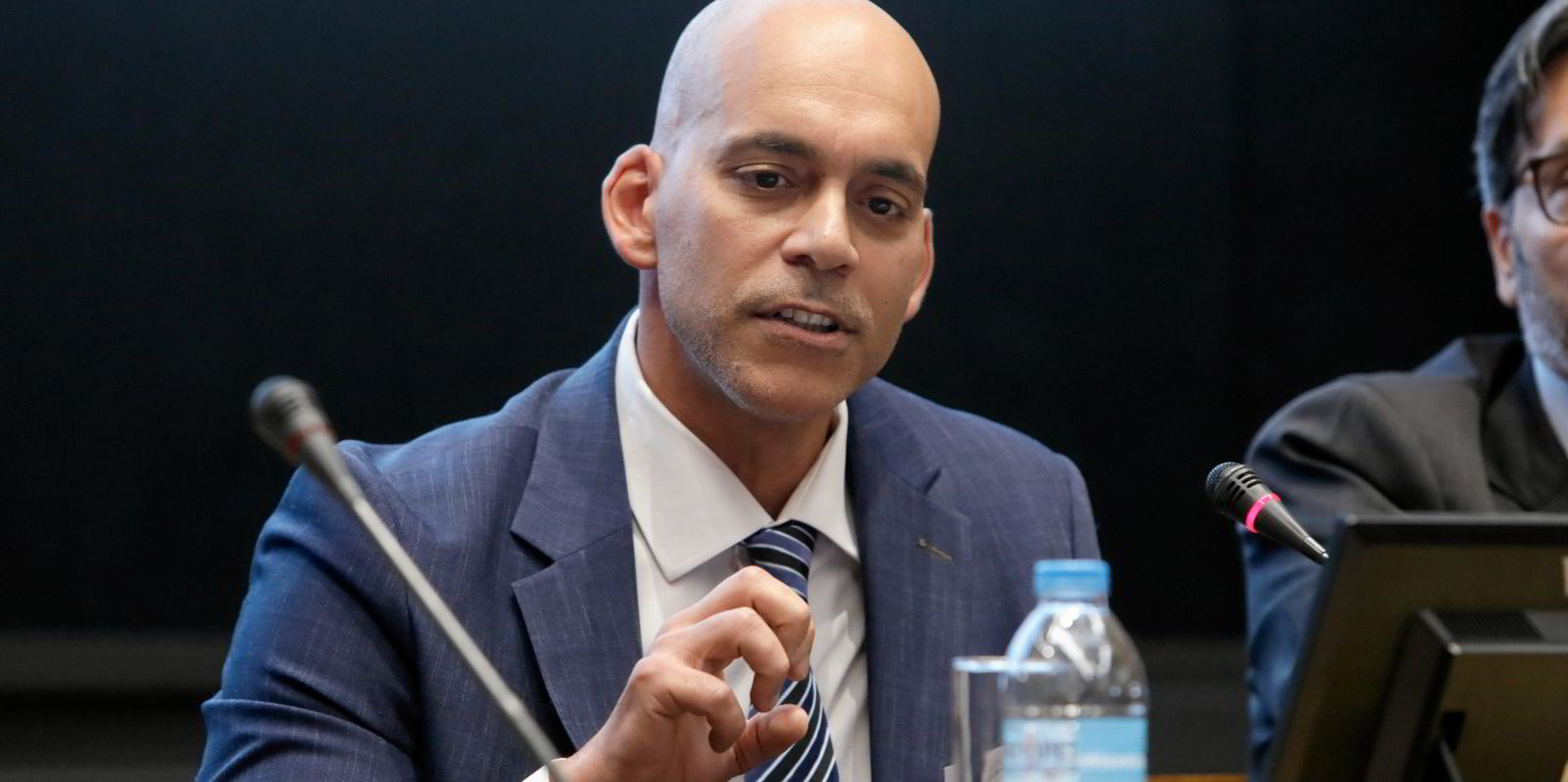
In a note to clients, Jefferies analyst Omar Nokta said a prominent theme for Navios Partners has also been derisking its fleet employment by locking ships into profitable long-term charters.
That includes a recent deal to charter the 59,800-dwt Navios Vega (built 2009) to Navios South American Logistics, a privately held sister company, for five years at $25,800 per day. The supramax bulker underwent conversion work to operate as a transshipment vessel.
And two of the recently announced LR2 tanker newbuildings are already locked into five-year charters.
“Navios has been successful in hedging its investments through attractive long-term charters,” Nokta said in a note to clients.
Are investors buying the risk management story that Navios Partners is selling?
The company’s stock price, as Nokta put it in a recent note, remains “deeply discounted” despite the consistent results delivered since it began diversifying in 2021.
Its shares were recently worth just over $22 on the New York Stock Exchange, and the analyst estimates the company’s net asset value tallies up to $100 per share.
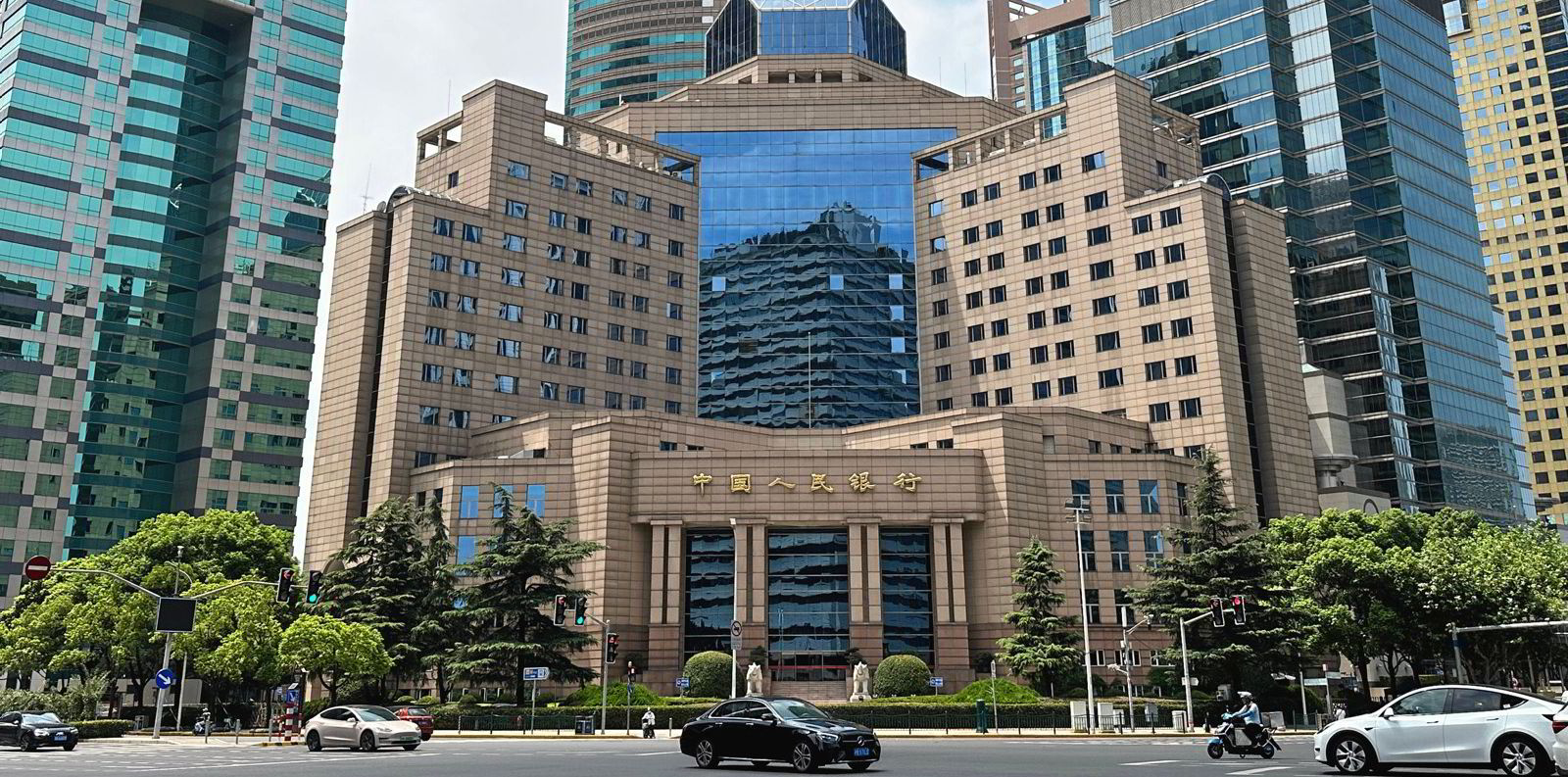
But when asked how investors are responding to the bigger Navios Partners and its exposure to the tanker, bulker and container ship spaces, Frangou said people recognise the value in diversification.
“It gives you a visibility that you cannot have easily,” she said.
Citi’s Wetherbee, however, said investors still feel more comfortable with stocks that allow them to express an opinion on one type of asset, like container ships, bulkers or tankers.
“In this current environment, I don’t sense a ton of appetite from the investment community for these types of portfolio approaches, for better or worse,” he said.
Only time will tell whether another environment, perhaps more difficult markets put pure-play shipowners under pressure, will change that appetite.
